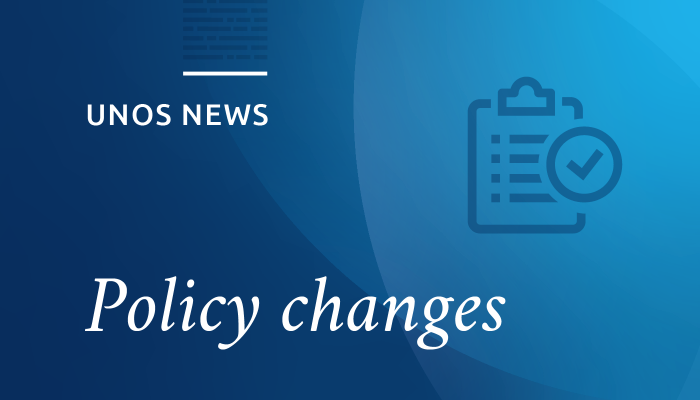Audience
- All OPO staff
- All transplant center staff
At-a-glance
OPTN data showed that a large number of organ allocations were based on matches OPOs executed before they had entered all of their infectious disease test results. We modified policy language to better define the process that OPOs must follow when they learn about positive infectious disease test results after executing a match. That policy is not in effect.
Changes OPOs will see in DonorNet
- If you first note a test result for HBV, HCV, HIV or CMV* (intestine only) as negative, unknown, not done, indeterminate, or pending and later change it to positive, new functionality will prevent you from sending any electronic notifications from prior match runs.
- If you mark the HIV infectious disease results field as positive, you will only be allowed to run HIV positive matches for liver and kidney.
- If you change the infectious disease test results for HBV, HCV, HIV or CMV (intestine only) from negative, unknown, not done, indeterminate, or pending to positive, a warning message will be displayed, reminding the user of the policy requirement to re-execute the match.
Learn: Visit UNOS Connect for “Re-execute a Match Run” (SFT112-D).
OPOs must follow these steps in the following situations:
1. Scenario: After you have executed a match run, you discover that your donor is HIV positive. Beginning November 21, 2015, it will be possible to transplant a HIV positive donor into a HIV positive recipient because of the federal HOPE** Act.
You must:
- Stop allocation on the original match run.
- Enter the positive HIV result in DonorNet.
- Withdraw any pending offers, regardless of whether the transplant hospital has accepted an offer.
- Re-execute the match runs. (You will only be allowed to run matches for livers and kidneys).
2. Scenario: After you have executed a match run, you discover that your donor tests positive for Hepatitis B, Hepatitis C, or Cytomegalovirus (intestine only). No one has accepted the organ offer.
You must: Stop allocation on the original match run.
- Report the updated donor test result in DonorNet.
- Re-execute the match run to reflect this positive result.
- Resume allocation using the new match run.
3. Scenario: After you have executed a match run, you discover that your donor tests positive for Hepatitis B, Hepatitis C, or Cytomegalovirus(intestine only). Before you became aware of the test results, the deceased donor organ has been accepted for a potential transplant recipient.
You must:
- Stop allocation on the original match run.
- Report the updated donor test result in DonorNet.
- Report this information to the first transplant hospital that accepted the organ as soon as possible, but within one hour of receiving this new test information.
- If the transplant hospital wishes to accept the organ for the primary potential transplant recipient despite the new donor test result, allocation is complete and you do not need to re-execute the match run.
- If the transplant hospital refuses the organ based upon this new information, you must re-execute the match run (you cannot offer the organ from the original match run to other potential recipients, even if they have accepted back up offers).
What will change for transplant centers?
- Read the policy notice to learn about the new requirements.
- Make sure your clinical coordinators know they need to re-evaluate a provisionally accepted organ offer when they learn of new infectious disease results. This may include additional informed consent(s.)
Questions?
If you have policy or general questions, contact your UNOS Regional Administrator at 804-782-4800. Contact UNOS Customer Service (UNetSM Help Desk), at 800-978-4334, for system and technical issues.
* HBV= hepatitis B
HCV= hepatitis C
HIV= human immunodeficiency virus
CMV = cytomegalovirus
**HIV Organ Policy Equity Act
May 12, 2023: Educational resource link updated

